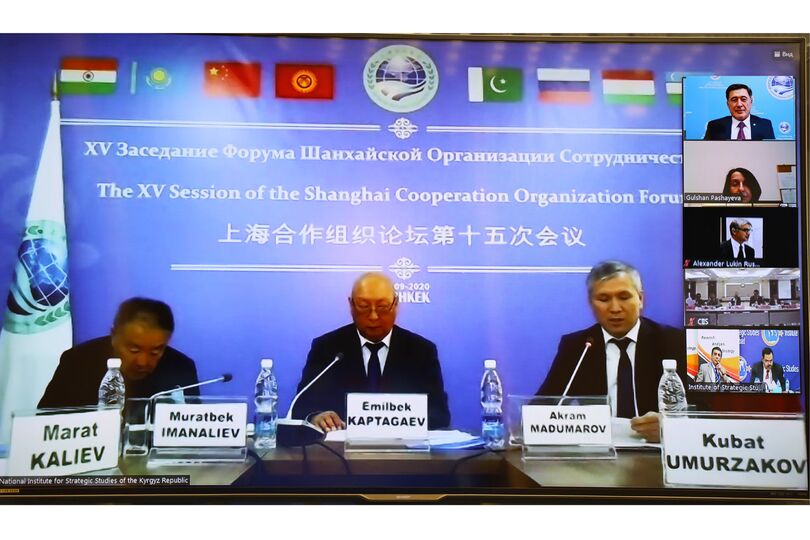On 29 September 2020, the SCO Forum held its 15th anniversary session via videoconference, chaired by the National Institute for Strategic Studies of the Kyrgyz Republic. The event brought together heads and experts from the leading research centres of India, Kazakhstan, China, Kyrgyzstan, Pakistan, Russia, Tajikistan, Uzbekistan, Belarus, Iran, Mongolia and Azerbaijan.
Vice Prime Minister of Kyrgyzstan Akram Madumarov, SCO Secretary-General Vladimir Norov and Director of the National Institute for Strategic Studies of the Kyrgyz Republic Emilbek Kaptagayev delivered welcoming remarks to the Forum's participants.
The event included a meaningful exchange of opinions on the topical issues on the Forum's agenda. These included:
· ensuring sustainable peace and stability in the SCO region: security challenges and threats related to the coronavirus pandemic
· new approaches and multilateral economic cooperation across the SCO space during the pandemic
· the role of the SCO Forum and cooperation prospects for overcoming the consequences of the coronavirus pandemic (in public healthcare, sanitary and epidemiological oversight, emergency response, education, tourism, etc.).
Vice Prime Minister Akram Madumarov said that the SCO countries demonstrated a high level of solidarity and mutual assistance in their efforts to contain the pandemic, showing the unity within the SCO, the soundness of their cooperation framework and their commitment to sharing not only epidemiological experience and clinical practices, but also to providing the required assistance to one another.
In his remarks, the SCO Secretary-General noted that at the height of the pandemic, and when faced with a challenging sanitary and epidemiological situation, the SCO upheld its commitment to the "Shanghai spirit" convincingly reaffirming its capability to serve as an effective platform for managing mutual assistance and responding to the emerging challenges, as well as facilitating efforts to overcome the political, social, trade and economic consequences of the COVID-19 pandemic.
The pandemic placed public health and sanitary well-being on top of the agenda, while security matters have also gained momentum considering the way the coronavirus affected information, humanitarian and social affairs. In this context, Vladimir Norov put an emphasis on information security as a topical issue. He mentioned that the statement issued following the Meeting of the SCO Council of Foreign Ministers on 10 September 2020 noted the unacceptable nature of using modern information technology, including the internet, to spread terrorist and extremist ideologies or interfere in the domestic affairs of sovereign nations.
The Secretary-General also noted that the SCO welcomed the launch of inclusive talks between the government of the Islamic Republic of Afghanistan and the Taliban in Qatar, and views this process as a major step towards strengthening security and stability within the SCO space.
Talking about the upcoming SCO Summit, to be chaired by the Russian Federation via videoconference in November 2020, and its agenda, Vladimir Norov informed the participants that the SCO leaders are expected to adopt a Plan of Action for the implementation of the SCO Development Strategy until 2025, among other documents. This plan sets out a roadmap for holding about 150 events in the key areas of SCO cooperation.
The Summit will also include the adoption of a comprehensive plan of action to fight epidemics, which provides for engaging in joint R&D efforts to find effective treatments, as well as creating a coordination mechanism for countering threats to sanitary and epidemiological well-being.
Vladimir Norov emphasised the importance of engaging in a comprehensive analysis of factors affecting the SCO's aggregate trade, economic, scientific and technical potential. It is from this perspective that he presented the outcomes of the first meeting of the SCO Consortium of Economic Analytical Centres that took place in August 2020.
Staying on the subject of expanding the analytical component in SCO activities, he noted that in the 15 years of its existence the SCO Forum has established itself as an important expert dialogue platform within the SCO. The organisation itself and its Secretariat have taken up many ideas discussed at the Forum and implemented them. Objective research on developments and processes affecting SCO development is essential for the SCO like never before. "In this context, it is high time for us to review the Forum's role within the SCO framework and add new meaning to its operation," the SCO Secretary-General pointed out.
In their reports at the Forum, participants noted the SCO's important role in international relations and contribution to stability and security in the Eurasian region, and also mentioned the need to continue efforts to fight terrorism and extremism, as well as other cross-border challenges and threats.
They stressed the need to coordinate joint efforts aimed at overcoming the socioeconomic consequences of the coronavirus pandemic and stepping up cooperation in healthcare. SCO countries can prepare themselves to face challenges like the COVID-19 pandemic by coordinating their efforts in exchanging research and clinical data and best practices regarding diseases that spread across borders, and devising single and effective response mechanisms. SCO member states could create mobile groups of experts and rapid response teams and hold joint exercises.
With the world at a strategic crossroads, characterised by the recurrence of various types of crises, a marked immune response to crises and building effective cooperation mechanisms are considered by experts to be an essential task. In addition, there is a need to strengthen the SCO's geopolitical and economic potential in order to keep up with the realities of today's world and to be able to respond to the global and regional crises, enhance the SCO's role in dealing with the key items on the international agenda and offer constructive development models.
Researchers and experts noted the importance of carrying out a comprehensive review of the SCO's activity in all its key aspects over the past 20 years and outlining development prospects, and expressed their readiness to further strengthen cooperation at the level of researchers and experts within the SCO.
